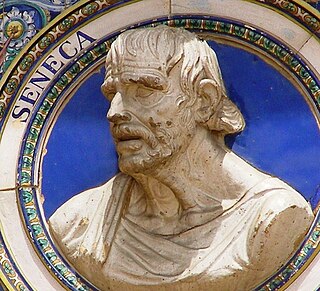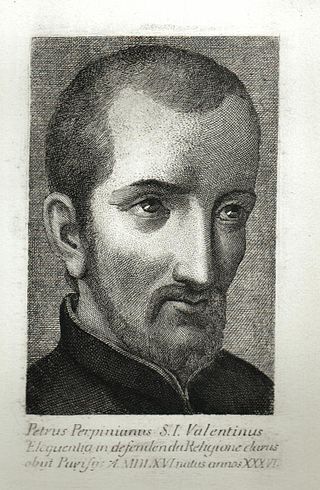
Rhetoric is the art of persuasion. It is one of the three ancient arts of discourse (trivium) along with grammar and logic/dialectic. As an academic discipline within the humanities, rhetoric aims to study the techniques that speakers or writers use to inform, persuade, and motivate their audiences. Rhetoric also provides heuristics for understanding, discovering, and developing arguments for particular situations.
A sophist was a teacher in ancient Greece in the fifth and fourth centuries BCE. Sophists specialized in one or more subject areas, such as philosophy, rhetoric, music, athletics and mathematics. They taught arete, "virtue" or "excellence", predominantly to young statesmen and nobility.

Giambattista Vico was an Italian philosopher, rhetorician, historian, and jurist during the Italian Enlightenment. He criticized the expansion and development of modern rationalism, finding Cartesian analysis and other types of reductionism impractical to human life, and he was an apologist for classical antiquity and the Renaissance humanities, in addition to being the first expositor of the fundamentals of social science and of semiotics. He is recognised as one of the first Counter-Enlightenment figures in history.

Kairos is an ancient Greek word meaning 'the right or critical moment'. In modern Greek, kairos also means 'weather' or 'time'.

Inventio, one of the five canons of rhetoric, is the method used for the discovery of arguments in Western rhetoric and comes from the Latin word, meaning "invention" or "discovery". Inventio is the central, indispensable canon of rhetoric, and traditionally means a systematic search for arguments.

Chaïm Perelman was a Belgian philosopher of Polish-Jewish origin. He was among the most important argumentation theorists of the twentieth century. His chief work is the Traité de l'argumentation – la nouvelle rhétorique (1958), with Lucie Olbrechts-Tyteca, translated into English as The New Rhetoric: A Treatise on Argumentation, by John Wilkinson and Purcell Weaver (1969).

Owing to its origin in ancient Greece and Rome, English rhetorical theory frequently employs Greek and Latin words as terms of art. This page explains commonly used rhetorical terms in alphabetical order. The brief definitions here are intended to serve as a quick reference rather than an in-depth discussion. For more information, click the terms.

Rhetoric of science is a body of scholarly literature exploring the notion that the practice of science is a rhetorical activity. It emerged after a number of similarly oriented topics of research and discussion during the late 20th century, including the sociology of scientific knowledge, history of science, and philosophy of science, but it is practiced most typically by rhetoricians in academic departments of English, speech, and communication.
Epistemology or theory of knowledge is the branch of philosophy concerned with the nature and scope (limitations) of knowledge. It addresses the questions "What is knowledge?", "How is knowledge acquired?", "What do people know?", "How do we know what we know?", and "Why do we know what we know?". Much of the debate in this field has focused on analyzing the nature of knowledge and how it relates to similar notions such as truth, belief, and justification. It also deals with the means of production of knowledge, as well as skepticism about different knowledge claims.
Topical logic is the logic of topical argument, a branch of rhetoric developed in the Late Antique period from earlier works, such as Aristotle's Topics and Cicero's Topica. It consists of heuristics for developing arguments, which are in the first place plausible rather than rigorous, from commonplaces. In other words, therefore, it consists of standardized ways of thinking up debating techniques from existing, thought-through positions. The actual practice of topical argument was much developed by Roman lawyers. Cicero took the theory of Aristotle to be an aspect of rhetoric. As such it belongs to inventio in the classic fivefold division of rhetoric.
Common sense is "knowledge, judgement, and taste which is more or less universal and which is held more or less without reflection or argument". As such, it is often considered to represent the basic level of sound practical judgement or knowledge of basic facts that any adult human being ought to possess. It is "common" in the sense of being shared by nearly all people. The everyday understanding of common sense is ultimately derived from historical philosophical discussions. Relevant terms from other languages used in such discussions include Latin sensus communis, Ancient Greek κοινὴ αἴσθησις, and French bon sens. However, these are not straightforward translations in all contexts, and in English different shades of meaning have developed. In philosophical and scientific contexts, since the Age of Enlightenment the term "common sense" has been used for rhetorical effect both approvingly and disapprovingly. On the one hand it has been a standard for good taste, good sense, and source of scientific and logical axioms. On the other hand it has been equated to conventional wisdom, vulgar prejudice, and superstition.

Over the ages, Italian philosophy had a vast influence on Western philosophy, beginning with the Greeks and Romans, and going onto Renaissance humanism, the Age of Enlightenment and modern philosophy. Philosophy was brought to Italy by Pythagoras, founder of the school of philosophy in Crotone, Magna Graecia. Major philosophers of the Greek period include Xenophanes, Parmenides, Zeno, Empedocles and Gorgias. Roman philosophers include Cicero, Lucretius, Seneca the Younger, Musonius Rufus, Plutarch, Epictetus, Marcus Aurelius, Clement of Alexandria, Sextus Empiricus, Alexander of Aphrodisias, Plotinus, Porphyry, Iamblichus, Augustine of Hippo, Philoponus of Alexandria and Boethius.

The New Science is the major work of Italian philosopher Giambattista Vico. It was first published in 1725 to little success, but has gone on to be highly regarded and influential in the philosophy of history, sociology, and anthropology. The central concepts were highly original and prefigured the Age of Enlightenment.

Theories of rhetoric and composition pedagogy encompass a wide range of interdisciplinary fields centered on the instruction of writing. Noteworthy to the discipline is the influence of classical Ancient Greece and its treatment of rhetoric as a persuasive tool. Derived from the Greek work for public speaking, rhetoric's original concern dealt primarily with the spoken word. In the treatise Rhetoric, Aristotle identifies five Canons of the field of rhetoric: invention, arrangement, style, memory, and delivery. Since its inception in the spoken word, theories of rhetoric and composition have focused primarily on writing

A Lesbian rule was historically a flexible mason's rule made of lead that could be bent to the curves of a molding, and used to measure or reproduce irregular curves. Lesbian rules were originally constructed of a pliable kind of lead found on the island of Lesbos.

A controversia is an exercise in rhetoric; a form of declamation in which the student speaks for one side in a notional legal case such as treason or poisoning. The facts of the matter and relevant law are presented in a persuasive manner, in the style of a legal counsel.
Theologia Poetica was a designation adopted throughout the Renaissance for political philosophy independent of Biblical revelation. In Italy, discussions on "poetic theology" were articulated most notably by Boccaccio and Petrarch, both of whom promoted a philosophical life capable of withstanding the inquisitorial scrutiny of theological orthodoxy.

India has a long tradition of rhetoric about politics, philosophy, and religion, starting from ancient times.

Eloquentia perfecta, a tradition of the Society of Jesus, is a value of Jesuit rhetoric that revolves around cultivating a person as a whole, as one learns to speak and write for the common good. Eloquentia perfecta is a Latin term which means "perfect eloquence". The term connotes values of eloquent expression and action for the common good. For Jesuits, the term eloquentia perfecta was understood as the joining of knowledge and wisdom with virtue and morality.

Pedro Juan Pepinyá, S.J. was a Spanish Jesuit humanist who contributed to the development of the Jesuit Cursus Conimbricensis commentaries on Aristotle and who revised Cypriano Soarez' De arte rhetorica.








